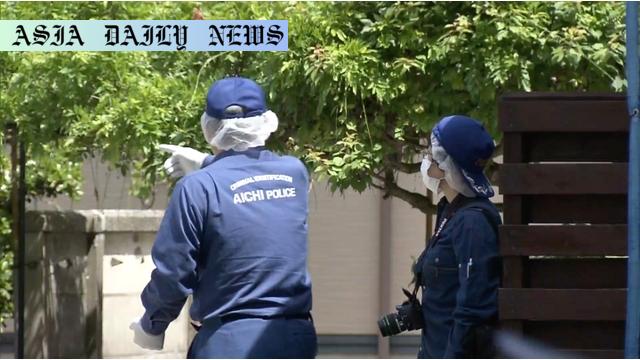Murder – A teenager has confessed to the fatal stabbing of his grandparents in their home in Tahara City, Japan.

Horrific Murder: Teen Suspect Arrested in Japan
Teenager Confesses to Brutal Double Murder
A 16-year-old boy in central Japan has been arrested on suspicion of brutally killing his grandparents in their family home. The case, which occurred in Tahara City, Aichi Prefecture, has sent shockwaves through the local community, raising concerns about family violence and youth crime.
According to authorities, the elderly couple—aged 75 and 72—were found in their residence with multiple stab wounds. Police confirmed that the young suspect, who has admitted to the crime, used a knife to attack them. The consistent nature of the injuries, particularly around the neck, suggests a persistent and violent assault.
Investigators retrieved the suspected weapon at the crime scene, where the horrific incident unfolded. Reports indicate that the boy lived with his grandparents in the home, and his statement to investigators suggests that he acted alone. On Sunday, the teenager was sent to prosecutors after providing a confession and implicating himself in the murder of both family members.
Community in Shock as Police Probe Deeper
The shocking nature of the crime has left neighbors and the larger community in disbelief. Tahara City, traditionally known for its peaceful environment, has never seen a crime of this magnitude. Residents have expressed their fear and heartbreak over the incident. While the motive for the crime remains unclear, police have started delving into possible reasons that may have led the boy to commit such an act.
Authorities have emphasized the particularly gruesome nature of the attack. Although the grandparents were in their seventies, the forceful and persistent stabbing suggests a concerning level of anger or distress in the young boy. This raises questions about mental health support for youth and the role of schools, families, and communities in identifying behavioral issues before they escalate into violence.
Calls for Prevention and Justice
In the aftermath of this tragedy, many are calling for stricter measures to prevent violent crimes involving youth. Social workers and legal professionals argue that early intervention in homes and schools can help identify and resolve issues before they escalate. As the boy’s confession has already been recorded, legal proceedings are expected to begin soon. However, the case also serves as a wake-up call for authorities to reassess how they handle youth offenders.
As the investigation progresses, questions about the boy’s mental state, the family dynamics involved, and the broader societal factors that might have influenced his behavior remain at the forefront. For now, the small town of Tahara City remains gripped in grief, searching for answers to a devastating event that has altered their sense of security.
The Larger Picture
This incident sheds light on the increasing reports of family violence not only in Japan but globally. Experts are urging governments to invest more in social infrastructure that supports both the elderly and the younger generations, ensuring that no one lives in an environment of isolation or hostility. While this tragedy is uniquely devastating, it underlines the common global issue of intergenerational conflicts.
In the days to come, the focus will remain on understanding what led to this tragic loss of life and ensuring that justice is served while also providing support to others who may be harboring similar struggles within their families.
Commentary
Reflections on Shocking Family Tragedy in Japan
A Deeply Troubling Incident
The recent events in Tahara City, Japan, have been deeply distressing and thought-provoking. To know that a 16-year-old boy is accused of taking the lives of his own grandparents is almost unfathomable. This case is a stark reminder of the fragility of family relationships and the potential for hidden conflicts to escalate into unthinkable tragedies. It leaves us grappling with the question: what circumstances drive a young person to commit such a violent act against those closest to them?
While details about the boy’s environment and mental state are still unfolding, the incident underscores the pressing need for family counseling and youth mental health support. Breakdowns in communication, unresolved tensions, or untreated mental health issues can lead to catastrophic consequences if left unchecked. In this regard, every individual, institution, and community has a role to play in fostering environments where young people feel supported and heard.
The Role of Society in Preventing Violence
This tragedy also highlights broader societal issues, including the pressures facing today’s youth and the generational divides that can sometimes fuel misunderstandings within families. Modern times have placed unique burdens on teenagers, including those related to academics, future expectations, and interpersonal relationships. Without proper support systems, these pressures can create internal turmoil, sometimes leading young people to act out in destructive and harmful ways.
Beyond family dynamics, the case also prompts us to examine the role of societal institutions. Schools, counseling services, and community programs serve as critical touchpoints for youth intervention. However, are these institutions adequately equipped to address the issues young people face? Are families aware of and using these services proactively to prevent conflicts and mental health deterioration? This tragedy serves as a wake-up call for stronger preventive measures.
Looking Ahead
Incidents like this, while horrifying, can serve as an opportunity for society to reflect, learn, and take action. We must invest in measures that build healthy family relationships, provide emotional and psychological support to youth, and create community networks that emphasize empathy and trust. Additionally, as legal proceedings against the boy unfold, it is crucial to balance the need for justice with compassion and a focus on rehabilitation. Addressing the incident requires not just punishment but a nuanced understanding of the causes behind it.
This case challenges us to look inward as families and communities. How can we better support each other? How do we foster environments where all members feel valued and understood? These are questions that deserve urgent attention as society grapples with the aftermath of such a devastating event.


